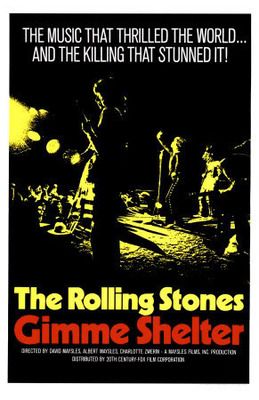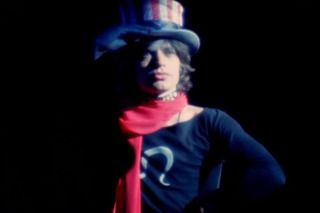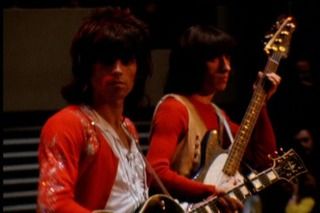
Gimme Shelter
1970
Director: Albert Maysles, David Maysles, Charlotte Zwerin
Starring: The Rolling Stones
I think that the Maysles brothers got really lucky when they made this film. They set out to make a documentary about the Rolling Stones’ 1969 US tour. Instead, they managed to film a significant real-life moment that has since been deemed a cultural turning point.
In an attempt to duplicate the magic of Woodstock, the Stones wanted to put on a free concert in San Francisco. We follow the Stones as they perform at Madison Square Garden, as they lay down some tracks in the studio, and watch as concert organizers scramble at the last minute to set up the free concert. On the day of the concert, the crowd is large, drunk, and stoned. Through the opening acts, the crowd becomes increasingly disorderly, and the Hell’s Angels respond with brutality. The film closes with footage of the infamous stabbing of a gun-toting concertgoer by a Hell’s Angel.
My favorite bit of the film is easily Charlie Watts’ opening “monologue,” for lack of a better word. We know what has happened. Everyone knew what happened at Altamont. At the very beginning of the movie, Mick Jagger and Charlie Watts listen to radio clips of reaction to the Altamont stabbing. Charlie, looking incredibly sad and contemplative, talks about what a great job the Hells Angels did in managing crowd control prior to the concert. This, after listening to a Hell’s Angel blasting the Stones on the radio. I see in Charlie’s reaction the realization that nothing was going right that night, and that with a pumped up crowd, a man with a gun, and the very nature of the Hell’s Angels themselves, blame cannot be levied on only one person or entity. If anything, it’s a realization that trying to put on a last-minute free concert in the name of a lot of free publicity and goodwill for the Rolling Stones, was not a good idea.

Because really, why did the Stones want to do this concert? They didn’t perform at Woodstock, and realized what they missed. So they go off saying that they’re going to do a free concert in San Francisco, and everyone thinks, “Hey man, groovy, good for them, they just want to play their music!” Bullshit. Although they wouldn’t benefit financially from such a scheme, they certainly benefit from public goodwill by such a gesture. It’s very telling, watching managers, lawyers, and volunteers scramble around them in order to make their gesture happen. As a radio DJ says, “It’s one of the most difficult things in the world to put on a free concert.” I don’t think they had any idea just how horrible it would turn out, but I also don’t buy for a second that it was a wholly altruistic gesture to begin with.
To that end, it’s interesting watching this film from the standpoint of comparing music culture in the sixties to the current pop music culture. Thos who grew up in the sixties immediately argue that music then was “just about the music,” and today, it’s all about the commercialization. While I wouldn’t argue against the latter, I also don’t buy that the former is true. I think it was MORE about the music in the sixties and seventies, but it was also a business. What I like about Gimme Shelter is the portrayal of music as a business – yes, even music in the sixties. It was not “all about the music.” It was distinctly about image and marketing as well. Mick Jagger, when he’s in front of media, is a very different creature than he is when he’s in the studio. He’s “performing” for the media, giving them the image they want, the image that sells The Rolling Stones to the public. As the film cuts back to Mick watching footage from a press conference, he watches himself respond to a reporter’s question, then says to the documentary filmmaker, “That’s rubbish.” He is editing and honing that public persona. I call bullshit on being “all about the music.” I would rephrase it as “more about the music than it is today.”

It’s frightening watching the violence unfold at Altamont. In the opening acts, crowd control quickly becomes an issue. I don’t mean to condone how the Hell’s Angels responded, but really, when crazy naked stoned people start charging at you, what on earth are you supposed to do? Then consider that the Hell’s Angels are not exactly the most coolly rational group of people on the planet, and naturally, the situation quickly grew out of control. By the time the Stones ultimately take the stage, they can’t even get through their first number before there’s an incident, and Jagger has to try to calm down both the crowd and the Hell’s Angels. It really does seem that violence was the only possible conclusion to the film.
I enjoyed the overall structure of the film; it did not feel like a rote rock documentary. For the first half, prior to the Altamont concert, we cut back and forth between “behind the scenes” footage of either the planning of Altamont or the Stones traveling on tour, and songs from the performance at Madison Square Garden. Stones in real life, Stones on stage; Stones in real life, Stones on stage. It’s basic, but it works. The Maysles brothers also wisely incorporate footage from Madison Square Garden of a few concertgoers rushing the stage, then being hauled off by security. They cut the film like a fiction film, including this as “foreshadowing” of the events at Altamont.
Again, though, I go back to my original statement: the Maysles brothers got lucky. Had there not been that violence at Altamont, this would have been a much less interesting film. Even with the buildup to the stabbing, I was so bored at certain points that I had problems trying to keep myself focused on the film and not on checking my email or pulling up a game of Solitaire. Maybe that’s partly because I am not a rock n’ roll gal. Of course there are rock songs I like; none of them are by the Rolling Stones. I would never voluntarily choose to watch them perform. I do not understand the appeal of Mick Jagger, not in the slightest. Had it not been for the violence, Gimme Shelter would only be a slightly less stereotypical rock documentary. Big whoop. Instead, though, the Maysles brothers got an event around which they could focus the “narrative.”
Overall, the main point of Gimme Shelter is clearly that the idyllic flower-power culture of love, drugs, peace, and music that was built up in the late sixties couldn’t last. It was nice experimenting with it, but that started to come to an end with increasing cultural tensions, like those between the Hell’s Angels and the concertgoers.
Oh, and really, I don’t need any crotch shots of Keith Richards. That was more than a little gratuitous.
Arbitrary Rating: 7/10
No comments:
Post a Comment